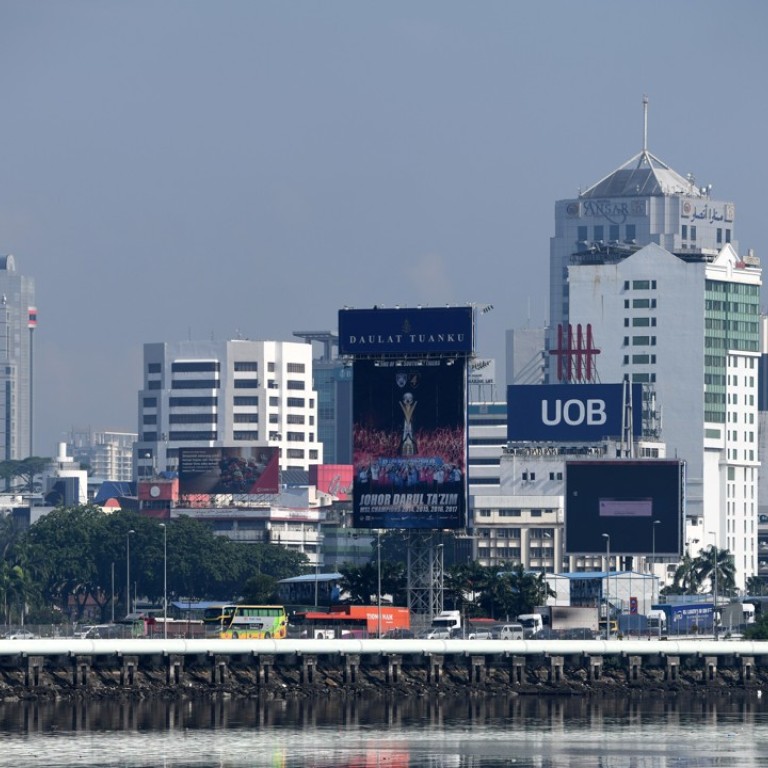
Malaysian election: Malay fortress Johor falls to Pakatan Harapan as ‘warlords are toppled by kids’
The loss of the third-richest state is a stunning blow for Najib Razak’s ruling Barisan Nasional coalition – experts say it is “ground zero” of a collapse in support nationwide
The “precious jewel” of Malaysia’s electoral landscape, third-richest state Johor, has fallen into opposition hands.
The Pakatan Harapan alliance has won 29 of Johor’s 56 state seats, compared to the ruling coalition Barisan Nasional (BN)’s 16 seats, with 10 more seats yet to be counted.
Long a stronghold for the ruling party and a key front line in the power struggle between Prime Minister Najib Razak and his one-time mentor Mahathir Mohamad, the flipping of Johor comes as a stunning blow to BN but not a surprise to several commentators.
Mahathir claims Malaysian election win, warns of ‘hanky-panky’
Independent polling centre Merdeka Centre’s programme director Ibrahim Suffian said that Johor was “a most critical state” for the ruling party.
“They have never lost ever, since Independence. If they lose Johor, which looks increasingly possible, it implies an unprecedented loss of support across the country. It is one of those states considered safe by the ruling party.
“If Barisan loses the state government as well as a substantial number of parliamentary seats, this signals a large trend leading to the end of what we have always thought we knew about Malaysian politics,” he told This Week in Asia.
Ibrahim described the shift as being due to “voter revolt over taxes and unhappiness with the economy”.
“In addition to that, there is also a backlash against some of the government leaders that were in the line-up for the election. Voters are speaking out against problems with governance in the country.”

Meredith Weiss, Professor of Political Science at the State University of New York in Albany, said the results signalled a shift in voter mindsets – from the politics of patronage to the politics of principle.
“The specific people who have fallen are those who have really mastered the art of using the resources and programmes that Barisan Nasional has available to build a base, and weren’t just relying on votes based on blind loyalty.
Warlords are being toppled by … kids
“They were actively involved but still lost. The results from Johor signify a renewal in politics, a potential new trajectory of how Malaysians evaluate leaders: warlords are being toppled by, essentially, kids.”
Weiss said that although the change may not indicate a new pattern altogether, the “enthusiasm and creativity” of Pakatan’s strategies in the BN stronghold succeeded in not just getting the vote out, but also getting the electorate excited.
“There is also the Singapore-Malaysia [aspect] to consider. The candidate in Kluang said that one-third of her voters lived in Singapore.
Neck and neck: Najib vs Mahathir puts Malaysia election on razor edge
“So then leaders must take into account what does it mean to be a Malaysian in Singapore, and what sort of approaches and priorities Malaysian politicians increasingly need to take or have – this is, of course, not unique to Johor but Johor serves as ground zero just because of its numbers.”

The fall of Johor will send shock waves through the linchpin party of BN, the United Malays National Organisation (Umno), the Malay-based party.
Johor is symbolically important to Umno because it is the birthplace of the party, in 1946, and seen as the bulwark state for the endurance of Malay rights and privileges in this multiracial country that practices affirmative action.
The BN’s pre-election promises in its manifesto for Johor included the upgrading of its tourism sector by way of construction of three entertainment parks.
The royal family, too, weighed in: with the Crown Prince publicly asking voters to not ‘change the boat’ if its engine was not broken.
Among the high-profile casualties in Johor was Malaysian Indian Congress president and federal Minister of Health Subramaniam Sathasivam – who lost in his seat of Segamat, which he has held since 2004.
MIC is another component party of the BN coalition.
Also notable was the loss in Labis of Chua Tee Yong, a vice-president of the Malaysian Chinese Association – another component party – and deputy minister to former businessman Edmund Santhara.

In Muar, newcomer Syed Saddiq Abdul Rahman, 25, wrested the seat from deputy minister Razali Ibrahim, a three-term MP for the area and member of Umno’s Supreme Council.
The state recorded a total of 1.33 million or 74.5 per cent voter turnout, with Tanjung Piai recording the highest turnout of 42,646 or 80.1 per cent from the overall 53,186 registered voters.
The state’s 26 parliamentary seats make it the second biggest seat bank in Malaysia: only the semi-autonomous Bornean state of Sarawak has a higher representation in the national legislature of 222 seats. It is also a Felda stronghold, with settlers homed across 11 parliamentary constituencies.
Is Chinese money an issue? In Malaysia, only at election time
“We are taking this battle very seriously. If we unlock Johor, we unlock the federal government,” said Syed Saddiq, who is also a close aide to the opposition alliance’s leader, Mahathir Mohamad.
Pakatan Harapan seems to have wrested away Johor by pulling in Malay votes and tapping into the state’s economic concerns.
“When we go into the kampongs [villages] people say prices have gone up, wages haven’t gone up … we think Malay support will swing our way this time,” Syed Saddiq said in the town of Muar, where he won.
Also in the ranks of the Parti Bribumi Bersatu Malaysia (Bersatu) is Muhyiddin Yassin, the country’s former deputy premier who was sacked by Najib in 2016 for publicly criticising his boss over the 1MDB corruption scandal.

